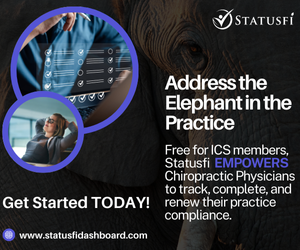
Worker Classification – Delegation, Kickbacks, Fraud
Over the past few weeks, we’ve focused on worker classification in the chiropractic office. This week we look at some of the other factors that come into play when classifying workers. Watch the video to learn more!
Transcript:
Over the last couple of weeks, we’ve been talking about appropriately classifying your workers, making sure that you’re not calling an employee an independent contractor, or an independent contractor, an employee, or whatever the case is because you don’t want the IRS to come in. If you want to know more about that, catch the first video in this series. It’ll explain all of the important reasons why you want to make sure that you get it correct. It’s not just an arbitrary decision. You have to make specific factors. You have to meet specific factors into consideration that fall under behavioral control, financial control, and the type of relationship. Review the first four videos and that’ll give you a walk-through for that.
What I really want to talk about are some of the other factors that really come into play when you start to look at your employees in a chiropractic physician’s office, and that’s delegation, fee splitting, anti-kickback, and vicarious liability. These are all things that come up on a regular basis. So first of all, delegation, this is really important to understand by the definition of the law and also by the you know, by the term of art and health care, delegation assumes a pretty high level of control over that particular employee. In essence, it means you’re billing as if you’re performing that task. So ultimately, it is nearly impossible, if not impossible, to really demonstrate that an independent contractor can be delegated to. In other words, you can’t assume that you can’t delegate to someone who you don’t have a pretty high level of control over, be a part of their training and their education if you will, and dictate to them precisely what’s going to happen. Typically, if you’re going to send a patient to someone who is an independent contractor, that’s more akin to a referral. So you’re referring for a particular service, and then they determine exactly how that’s going to play out and how they deliver that care. Remember, they have to have someone in control over exactly what they’re doing.
In these cases, when you’re talking about delegation, you’re giving very specific orders of exactly what needs to be done and how it needs to be performed in the whole nine yards. That level of control and delegation for an independent contractor really isn’t going to work, and so make sure that when you delegate, if you’re billing on your claim forms things along those lines that it is to an employee. It’s incredibly important, and you want to get that right, because most likely, you would miss all of the other important factors that the IRS would determine and have the penalties that we talked about in the first video. So make sure you get that right.
There are other factors that come into play when you start talking about fraud and anti-kickback. And so the way that all of that works is anti-kickback is when you’re paying somebody for a referral, and so you’re paying somebody for performing a particular service, or whatever the case might be. However, there are some safe harbors in play and not every time, but the vast majority of the times, really, your fraud and abuse risks are reduced when you have a bona fide employer-employee relationship. And that’s a key term there, but a bona fide employer-employee relationship, and so this goes back to some of the factors that we already talked about that the IRS established. But that’s kind of a statement from the OIG. Additionally, when they start looking at the anti-kickback statutes, you know that mostly the law disfavors payment structures that involve compensation for services to patients referred by a compensated party, except for bona fide employees, and so if there is an exchange of payment for treatment of patients, although we can talk about how that may fit into the construct of fee splitting within the confines of the Medical Practice Act, there could be some challenges in regards to how that would potentially play out with the anti-kickback statutes that would have to be really closely looked at by an attorney if you’re talking about a separate independent contractor. But again, you know they do make significant exceptions for those bona fide employees, and so those are critical factors when you make the determination, do you want to make them an employee or an independent contractor? When you set that up again, independent contractors become a bit more challenging and a bit more problematic, and so be careful. True employment situations are key.
The last one is this, and we get this question a lot, well, my liability is increased if they’re an employee. Well, the fact of the matter is that probably isn’t true, most likely if they’re practicing at your location and they’re a part of your practice, and even if they’re an independent contractor, you potentially could have, you could have vicarious liability, and they could overreach. In fact, most likely there, you would be named in any kind of lawsuit that would come down in those particular cases. So what you want to do in those cases, you want to make sure that if it truly is an independent contractor situation, and you’ve met all the important factors in that, that independent contractor has their own malpractice. It’s very important. And then you just want to triple check with your malpractice to make sure that you’re going to be covered if that, if that independent contractor is ultimately, you know, sued, and you are named as a part of that if they’re practicing renting a room or whatever the case might be within your within your practice.
Additionally, just double-check with your malpractice carrier if they are if it is a bona fide employee situation, or if you have an employee, just make sure with your malpractice carrier that your employees, the employees that you’re delegating to, are covered. And we hear good things that come out of our malpractice carriers. It’s always, it’s always important to ask those questions so that you are confident and you’re assured and going into it, but those are key factors to take into consideration when you make that determination on your worker classification. Hopefully, this helps you out, and we’ll catch you next week.



















